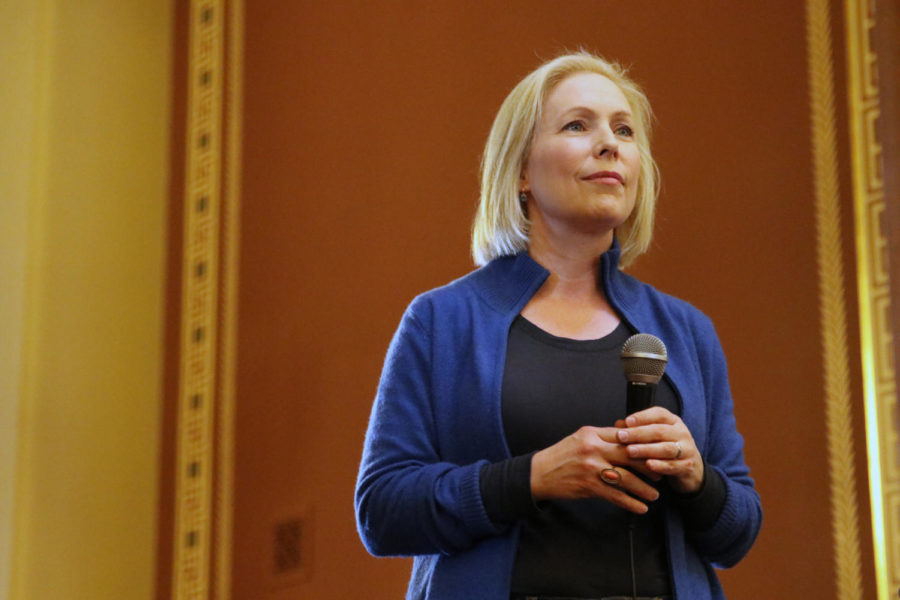- News
- News / Election
- News / Nation
- News / Politics And Administration
- Politics
- Politics / Rally Coverage
- Politics / The Candidates
Sen. Kirsten Gillibrand stops in Ames, talks 2020 elections
Katlyn Campbell/Iowa State Daily
Kirsten Gillibrand, New York senator, speaks to the audience of women’s rights activists at the closing of the 2019 Women’s March Iowa Jan. 19 at the Iowa Capitol in Des Moines. “Women still do not represent 51 percent of elected leaders in this country. Imagine just for a moment what America would look like if it did. Imagine what would be possible. Do you think we would still be fighting tooth and nail for basic reproductive freedoms in this country? No. Do you think that we’d be hesitating to pass a national paid leave bill, equal pay for equal work, affordable day care, universal pre-K? No. Do you think it would be so hard to end sexual violence in our military, on college campuses and in society in general? No. And finally do you think our senate would be causing a vote on denying women’s reproductive care when they should be opening the government and giving paychecks to the 800,000 workers who have gone without their pay this week,” Gillibrand said.
January 19, 2019
New York Sen. Kirsten Gillibrand stopped at Stomping Grounds on Saturday morning to talk with the residents of Ames about her upcoming run for president in the 2020 elections.
Rep. Beth Wessel-Kroeschell, who represents Iowa’s 45th District at the Statehouse, introduced the senator after borrowing a line from Barack Obama, letting the Senator know Iowans like to “check the tires, look under the hood and make sure we have the right candidate.”
“[These] first events are a great opportunity for candidates to introduce themselves to the people who are very involved,” said David Peterson, a political science professor at Iowa State who was at the event. “When I look around I see these are the folks who will be at these events, who will talk and tell friends, and have that snowball effect.”
Centered among residents, visitors and bustling cafe employees Gillibrand fielded a total of five questions in the half hour.
Julia Sager, a program coordinator for Ames Lab and graduate student in agricultural and biosystems engineering, expressed concerns about the United States’ shifting role in the international community and the risks of a worldwide military conflict.
“You’re worried about our national security, you’re worried about stepping away from our allies in the world. I share those worries,” Gillibrand said. “Because we have stepped away from our allies in our world and the mantle of leadership … The next president must reclaim that mantle, be a leader on the world stage, bring people together for world security.”
Several attendees expressed concerns with the causes and impacts of global climate change. Gillibrand made clear the matter was not up for debate.
“Maybe some people’s fear about [accepting] climate change is that jobs will be lost … we’ll explain to them that that’s not true and that this is the greatest economic opportunity of our generation,” Gillibrand said.
Gillibrand elaborated on the crucial role of Congress in the expansion of renewable resources.
“When we decided over the last 10 years not to have the tax benefits so people could focus on wind, and solar, and geothermal and biofuels and all the renewable energies that are possible … we lost an opportunity because Congress wasn’t smart enough, Congress couldn’t think ahead,” Gillibrand said.
A local high school teacher asked Gillibrand how she can reassure her graduating seniors that higher education is worth it in the face of mounting student debt.
“The most immediate solution I’d give with all those people laden with debt, I would refinance all federal debt at 4 percent which is the going federal rate automatically,” Gillibrand said.
Gillibrand has introduced the Federal Student Loan Refinancing Act, which would allow student borrowers to refinance their student debt at a lower interest rate, just as business-owners and homeowners are able to do.
“We have to make access to college, and access to higher education, something that is a real right,” Gillibrand said. “That means providing better job training … Anyone unemployed should have access to training to get [a] job.”
Dylan Meyer, a senior in political science, was hoping to hear more on the 18-year-old global war on terrorism.
“I’m 22 years old, and I don’t remember a time our country was not at war,” Meyer said. “There are people turning 18 who are enlisting in a war that began before they were even born.”
Meyer was the first to get a one-on-one with Gillibrand when the open forum concluded. As cameras and microphones crowded the two, Meyer expressed his concerns.
“She said she was looking for a new Authorization for Use against Military Forces (AUMF),” Meyer said. “I don’t know if the president should have that authority.”
The AUMF grants the president the authority to use all “necessary and appropriate force” against Al-Qaeda and other militant groups without Congressional authorization.
As the crowd dispersed, Peterson gave his thoughts on Gillibrand’s dialogue.
“One, she constantly came back to seeing things as a mom and using the language of people’s worries,” Peterson said. “I think that’s important. And two, she didn’t make criticism of the president her centerpiece. She spoke to the issues people care about.”
Morgan Jensen, a recent Iowa State graduate, said she appreciated Gillibrand’s framework of motherhood, a quality unique to women in politics.
“We have to understand the basic challenges that people are facing and solve them and fight for them as hard as you would fight for your own children,” Gillibrand said. “So that is why I’m running because I will fight for your own children as hard as I fight for my own.”






